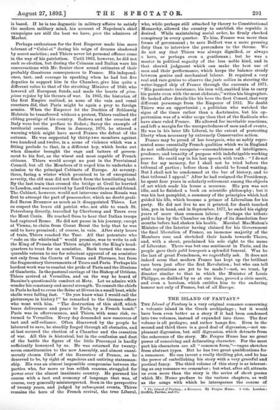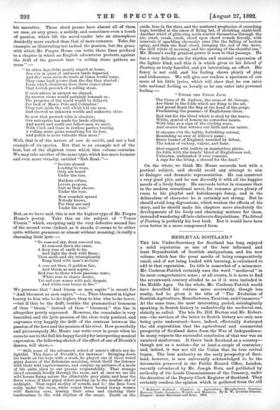THE ISLAND OF FANTASY.*
THE Island of Fantasy is a. very original romance concerning a volcanic island in the Greek archipelago ; but it would have been even better as a story if it had been condensed into two volumes, instead of expanded into three. The first volume is all prologue, and rather hangs fire. Even in the second and third there is a good deal of digression,—not un- pleasant digression, but still digression, which detracts from the coherence of the story. Mr. Fergus Hume has no great power of conceiving and delineating character. For the most part his characters are all "common form,"—vague sketches from abstract types. But he has two great qualifications for a romancer. He can invent a really thrilling plot, and he has the power of embellishing his story with a very graceful and poetical fancy. The third volume of this story is as interest- ing as any romance we remember ; but what, after all, attracts us even more than the story is the series of short poems which Mr. Hume prefixes to the various chapters, as well as the songs with which he intersperses the course of • The Island of Fantasy: a ROT11.4MCO. By Fergus Hume. 3 vols. London: Griffith, Earran, and Co.
lais narrative. These short poems have almost all of them an ease, an airy grace, a melody, and sometimes even a touch of passion, which lift the novel-reader into an atmosphere decidedly more exalted than that of mere romance. Take, for example, as illustrating not indeed the passion, but the grace with which Mr. Fergus Hume can write, these lines prefixed to a chapter in which an English adventurer protests against the drift of the proverb that "a rolling stone gathers no
moss" :—
"In olden days folks mostly stayed at home, Nor e'er in quest of unknown lands departed, And tho' some ne'er-do-weels at times would roam, They came back poorer than the day they started : From which disastrous lives there comes alone That foolish proverb of a rolling stone.
If such advice in earnest we obeyed, Its narrow views would certainly benumb us ; The progress of the world would be delayed, For lack of Marco Polo and Columbus !
They tore aside the veil which hid our eyes, And showed us unknown worlds and unknown skies.
So now that proverb trite is obsolete ; Our enterprise has made far lands alluring, And north and south our fellow-men we meet, With Cook and Gaze in restless parties touring. A rolling stone gains something for its loss, And polish is more valuable than moss."
Well, that is of the nature of vers de societe, and not a bad example of its species. But that is an example not of the best, but of the slightest verse which this volume contains. We may take another of the same type, which has more humour and even more vivacity, entitled "Sub Rost :"— " Secrets absurd Leading to woes, Only are heard Under the rose.
Maidens refuse, Lovers propose, Just as they choose, Under the rose.
How scandals spread Nobody knows, For they are said Under the rose."
But, as we have said, this is not the highest type of Mr. Fergus Hume's poetry. Take this on the subject of "Venus Urania," which, excepting only the very defective second line of the second verse (indeed, as it stands, it seems to be either quite without grammar, or almost without meaning), is really a charming little lyric :—
"To rose-red sky, from rose-red sea, At rose-red dawn she came, A fiery rose of earth to be, And light the dark with flame ; Then earth and sky triumphantly Rang loud with man's acclaim.
A rose art thou, 0 goddess fair, And bloom as men aspire,—
Red rose to those whom passions snare, White rose to chaste desire;
Yet red rose wanes with pale despair, And white rose burns as fire."
We presume that "And bloom as men aspire "is meant for "And bloomest as men aspire,"—i.e., Thou bloomest in higher beauty to him who looks higher, than to him who looks lower, —bat if that be the drift, besides the grammatical looseness of thou " bloom " instead of thou "bloomest," this line is altogether poorly expressed. However, the remainder is very beautiful, and the lyric passion of the close truly poetical, and expresses very happily the drift of the contrast between the passion of the hero and the passion of his rival. How powerfully and picturesquely Mr. Hume can write even in prose when he cares to use to the full his happy faculty for interpreting musical expression, the following sketch of the effect of one of Dvorik's dances, will show,-
"' Still, some of the advanced school of music's efforts are de- lightful. This dance of Dvorik's, for instance.' Bringing down his hands on the keys with a crash, he played one of those weird gipsy dances of the Bohemian musician, which thrill the listener with their wild capriciousness, and conjure up pictures of a mode of life quite alien to our prosaic respectability. That strange chord resounds loudly through the room, and at once we see the wild horses flying across the illimitable grey plain, and hear the fierce voices of their gipsy riders pealing up to the sombre sky of midnight. That rapid medley of sounds, and lo 1. the fires burn redly under the trees, while round them bound tawny women with flashing eyes, tossing their arms and clashing their tambourines to the wild rhythm of the music. Death on the
cards, love in the stars, and the muttered prophecies of crouching hags, terrified at the omen of flying bat, of shrieking night-bird. Another whirl of glittering notes scatter themselves through the air, crash, crash, crash, chord upon chord sounds fiercely, with intervals of sparkling chromatic runs like the falling of broken spray, and then one final chord, bringing the red of the dawn, the chill winds of morning, and the uprising of the cheerful sun." Mr. Hume's really greatest power is seen in that passage. He
has a very delicate ear for rhythm and musical expression of the lighter kind, and this it is which gives to his Island of Fantasy so truly fanciful, and yet interesting, an effect. His fancy is not cold, and his feeling shows plenty of play and iridescence. We will give our readers a specimen of one more of his little lyrics, which will show that he can enter into national feeling as keenly as he can enter into personal feeling :—
" UNDER THE UNION JACK.
The Cross of St. Andrew, the cross of St. George, Are blent in the folds which are flung to the air, And proud floats the flag at the head of the gorge, Proclaiming the presence of Englishmen there.
Red tint for the blood which is shed by the brave, White, symbol of honour no cowardice taints, With blue as a sign of the circling wave.
And crosses that witness our faith and our saints.
It streams o'er the battle, forbidding retreat, Reminding us ever of Albion's name ; Brave banner of England, unsoiled by defeat, The token of victory, valour, and fame.
Shot-ragged with bullets on numberless plains, Its folds with the hearts' blood of Englishmen red, Unbeaten, undaunted it ever remains, A sign for the living, a shroud for the dead."
On the whole, we think Mr. Hume succeeds best with a poetical subject, and should avoid any attempt to aim at dialogue and dramatic representation. He can construct a very good plot, and he can diversify it with all the happier moods of a lively fancy. He succeeds better in romance than in the modern sensational novel, for romance gives plenty of room to his playful and kaleidoscopic fancy, and in the delineation of character he is certainly not strong. But he should avoid long digressions, which weaken the effects of his story, and he should make his chapters more absolutely the developments of his lively and charming mottoes for them,
instead of wandering off into elaborate disquisitions. The Island of Fantasy is probably his best book. But it would have been even better in a more compressed form.



































 Previous page
Previous page